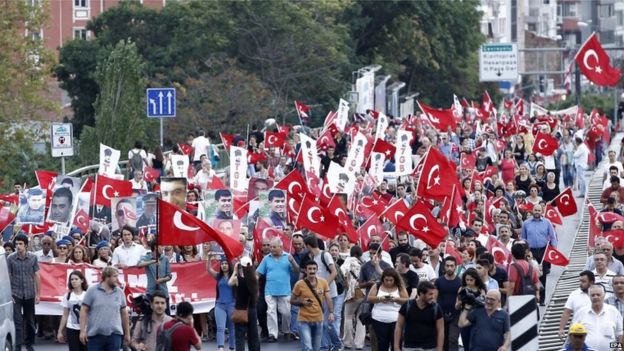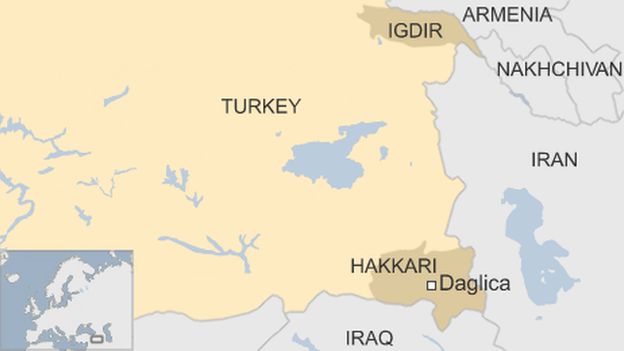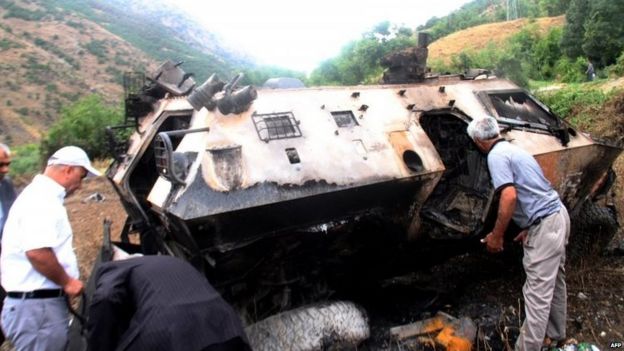Turkey strikes PKK in northern Iraq as police bus is bombed
By BBC News
Turkish warplanes have launched a wave of air strikes on Kurdish PKK rebel bases in northern Iraq after its security forces came under attack in eastern Turkey.
Dozens of jets were said to be involved in the raids hours after Prime Minister Ahmet Davutoglu pledged to "wipe out" rebel strongholds.PKK bombs killed at least 16 Turkish soldiers on Sunday, the army said.
A further attack on a police minibus on Tuesday claimed at least 12 lives.
PKK (Kurdistan Workers' Party) rebels targeted the vehicle as it was heading towards a border post close to the Azerbaijan-run enclave of Nakhchivan, reports said.
The surge in violence follows the collapse of a ceasefire in July between the army and the PKK.
The truce, which began in 2013, unravelled after a suicide bombing by suspected Islamic State militants near the border with Syria led to mutual recriminations between Kurdish groups and Turkey.
Spiral of attacks - by Selin Girit, BBC News, Istanbul
Not a day passes by in Turkey these days without violence. And as one attack follows another, emotions are running high.The funerals of 16 soldiers killed in Sunday's PKK attack were taking place on Tuesday.

There is now serious concern that the violence could spiral out of control.
Turkey is gearing up for snap elections on 1 November after the ruling AK Party lost its overall majority in June elections and failed to form a coalition government.
It was the HDP that deprived the AKP of its majority, polling over 13% of the vote and entering parliament as a political party for the first time.
Opposition figures have voiced concerns about maintaining poll security, especially in Turkey's predominantly Kurdish east and south-east of the country.
Turks question explosion in tensions with PKK
More than 40,000 people have died since the PKK launched its armed campaign in 1984, calling for an independent Kurdish state within Turkey.
In Sunday's attack, the PKK detonated bombs near two military vehicles in the village of Daglica, a mountainous area close to the border with Iraq.

"Those mountains will be cleared of these terrorists. Whatever it takes, they will be cleared," he said.
President Recep Tayyip Erdogan, too, promised a "decisive" response.
At least 35 PKK (Kurdistan Workers' Party) rebels were killed in air raids by F4 and F16 jets on bases at Qandil, Basyan, Avashin and Zap early on Tuesday, according to the Anadolu news agency.
'Self-rule'
After President Erdogan's remarks on the PKK attack, about 200 people chanting slogans in his support attacked the offices of Turkish newspaper Hurriyet in Istanbul.They accused the news organisation of misquoting Mr Erdogan and implying that he was trying to gain political capital from the Daglica attack.
 I
I The government says military operations against the Kurdish rebel group will continue until it withdraws from Turkish soil and disarms.
Curfews have been imposed in several towns where clashes took place and more than 100 districts have been declared "temporary security zones".
In response, several municipalities in the predominantly Kurdish east and south-east of Turkey have announced "self-rule".
Critics accuse President Erdogan of renewing violence to curb the support for the pro-Kurdish People's Democratic Party (HDP), whose 14% share of the vote in June elections cost the governing AKP its majority in parliament.
The government denies these accusations. Many people fear the clashes will mount as snap elections scheduled for November draw closer.


0 Comments:
Post a Comment
Subscribe to Post Comments [Atom]
<< Home